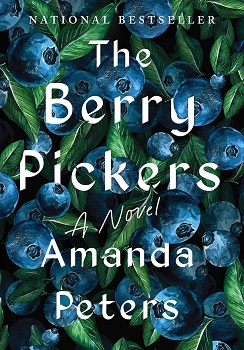The Berry Pickers by Amanda Peters
We’re several months away from berry season here in Whatcom County but that shouldn’t deter you from reading Amanda Peters’ thoughtful debut novel “The Berry Pickers,” which won the Andrew Carnegie Medal for Excellence in Fiction and topped many “best of the year” lists.
The book opens during the summer of 1962, the day that Ruthie, the 4-year-old daughter of a Mi‘kmaq family of berry pickers from Nova Scotia, goes missing from a farm in Maine. Her 6-year-old brother Joe was the last to see her, sitting on their favorite rock eating a bologna sandwich, wearing a hand-me-down sundress and watching a crow steal the discarded crusts. The image is seared into Joe’s memory, along with the cries of his family yelling Ruthie’s name, searching desperately and not finding her.
A lifetime later, a woman named Norma tries to piece together dreams she had as a child, of moonlight and campfires and coyotes, and a brother she never had, and a woman “cloaked in darkness” whose worn hands would comfort her in a thunderstorm. She remembers thinking that her house was not her house, and no one was who they were supposed to be.
Her mother would soothe her, redirect her, convince her that her memory was faulty. “You’re confused,” she’d insist, and Norma learned that her line of questioning usually led to one of her mother’s terrible headaches. Best to stop talking about the dreams, lest it upset Mother, who would start obsessively cleaning, keeping the house spotless for visitors that never came, worrying and waiting.
As the chapters alternate between Joe — now in treatment for cancer and nearing the end of his life — and Norma, slowly unpacking the details of her long-buried childhood, it’s no surprise to the reader that Norma is Ruthie, and that Joe’s life was nearly irreparably damaged by the trauma that came from losing his beloved baby sister.
What Peters does so well is imagine the ways that Joe’s trauma manifested itself, and show his choices and human frailty with compassion and clarity. Peters has similar insights into Norma’s experience, as Norma discovers the full scope of her family’s lies and the impact it has had on her ability to form loving relationships. As Joe, on his deathbed, reconnects with his daughter, mother and siblings, we see the strength of familial bonds and their unwavering conviction that one day the whole family will be together again.
“The Berry Pickers” is not simply a tale of Indigenous exploitation and hardship. It’s about the grief of losing children, whether through miscarriage or abduction. It’s about guilt, and self-medication for pain, and mental illness, and loneliness. It’s also about hope and family, love and resilience and ultimately, forgiveness.
Christine Perkins is executive director of the Whatcom County Library System, wcls.org.
(Originally published in Cascadia Daily News, Sunday, April 20, 2025.)

